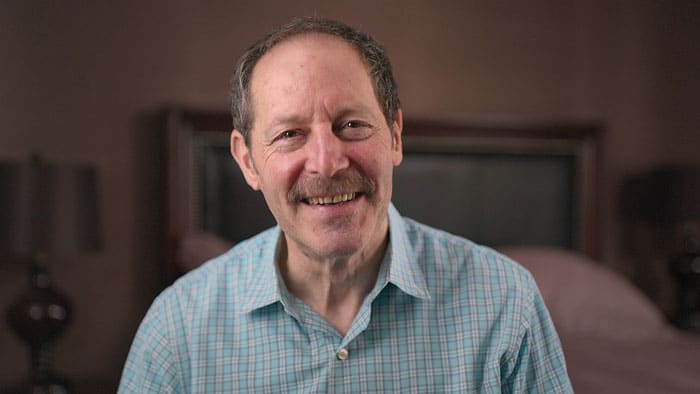 Steve Spitz. Courtesy of Netflix
Steve Spitz. Courtesy of Netflix Steve Spitz was a fan favorite on Netflix’s “Love on the Spectrum,” which follows seven people on the autism spectrum as they explore the world of dating. A social butterfly with a kind heart, Spitz, 64, genuinely enjoys giving compliments, spending time with others and making his friends laugh.
While most of the people on the show were diagnosed with autism in childhood, Spitz was diagnosed later in life. He was also the oldest cast member. During the show, Spitz went on a couple of dates with two women, but is still searching for his soul mate.
“I haven’t really gone on many dates yet, but I am getting many lovely people coming up to me and cheering me on,” Spitz told the Journal. “Waitresses have given me their phone numbers, and others have approached me. However, they were either too young or just not the right person for me.”
As February is Jewish Disability Awareness and Inclusion Month (JDAIM), it’s the perfect time to shed light on Spitz and his quest for love.
As February is Jewish Disability Awareness and Inclusion Month (JDAIM), it’s the perfect time to shed light on Spitz and his quest for love.
Spitz, who is neurodivergent and requires minimal support, thinks many Jewish people are neurotypical. “What is funny is that I don’t seem to associate neurodiversity with Jewish people,” he said. “I am very happy that there is JDAIM, so that perhaps I can see that there are other people who are Jewish and also neurodivergent.”
Spitz said he sometimes feels intimidated by the achievements of Jewish people.
“I am Jewish, but I am different,” he said. “I would like to meet other Jewish people who are more like me.”
Spitz likes cars, music (especially The Beatles) and playing with words, names and puns. He describes himself as kind, loving and with good intentions.
“I want to share the great feelings that I am getting from being neurodivergent with someone I love a lot,” he said.
Spitz was born in Los Angeles; his family moved to San Francisco when he was 4 years old. He’s loved his Judaism since he was a child. “I was raised in a loving, positive Jewish home,” he said.
Spitz would go with his grandparents to Temple Emanuel in L.A. Once his family moved to the Bay Area, they attended Congregation Beth Shalom in San Francisco. Spitz had his bar mitzvah there, and now goes to the synagogue as an adult.
“I attend Friday night Shabbat services on a weekly basis,” Spitz said. “I also have private meetings with the rabbi three or four times a year to discuss Torah, the meaning of her sermons and where I am in my life now.” While he took a 40-year break from weekly Shabbat services, Spitz has always attended High Holy Day services. Even during the pandemic, he attended via Zoom.
“My personal assistant and I observe Tashlich and I work with my life coach, Elaine Hall, setting goals for the new Jewish year, and letting go of my old limiting habits and beliefs, feelings of regret, etc. I allow myself to explore through Tashlich each year … Sometimes I am too hard on myself and feel that I messed up so long ago, and my Jewish practices help me to forgive myself and to begin [anew] every Jewish New Year.”
Spitz recalled going to Jewish singles events in his 20s, 30s, 40s and halfway through his 50s.
“I stopped when I got older because everyone was so young,” he said. “I understand now that I was trying so hard to be someone that I wasn’t and the women that I went for may have not been interested in me.”
While other women may have shown interest in Spitz, he said he might have looked the other way. “I regret not being myself then and not being interested in women who might have been on the spectrum,” he said. “Today I see things differently.”
Being on “Love on the Spectrum” has meant the world to Spitz.
“It is the first time that I am feeling valued and celebrated for being myself and not having to mask or pretend to be anyone else but myself,” he said. “If anything, I need to give myself credit for this. The seeds for seeing myself in this way have been planted, and I just need to grow with wherever they go.”
When asked what advice he has for others on the spectrum who are looking for love, he said to continue being true to yourself.
“I am now going on that exact road myself,” he said. “I look forward to us all finding true love with someone who loves us for exactly who we are.”






















 More news and opinions than at a Shabbat dinner, right in your inbox.
More news and opinions than at a Shabbat dinner, right in your inbox.